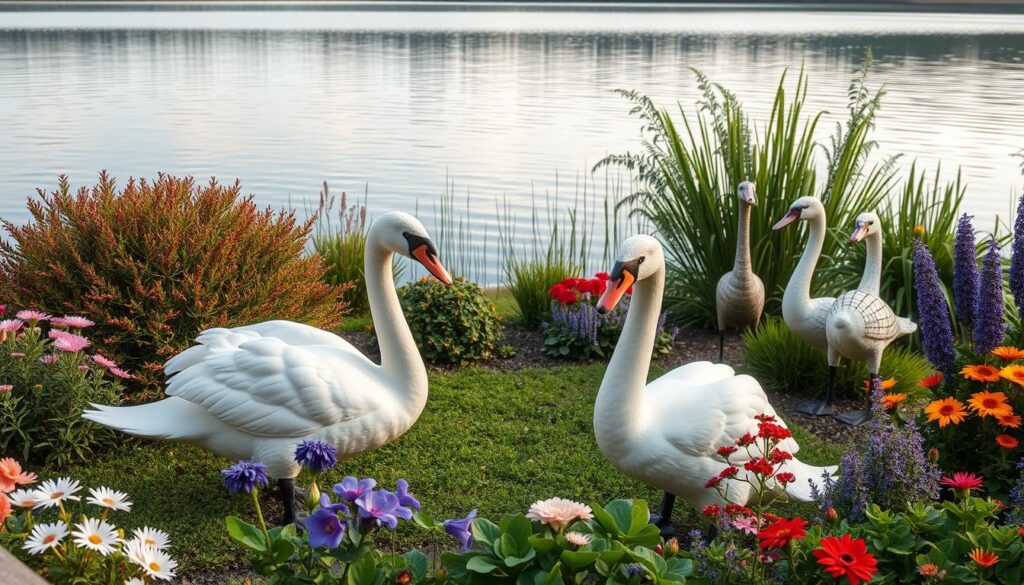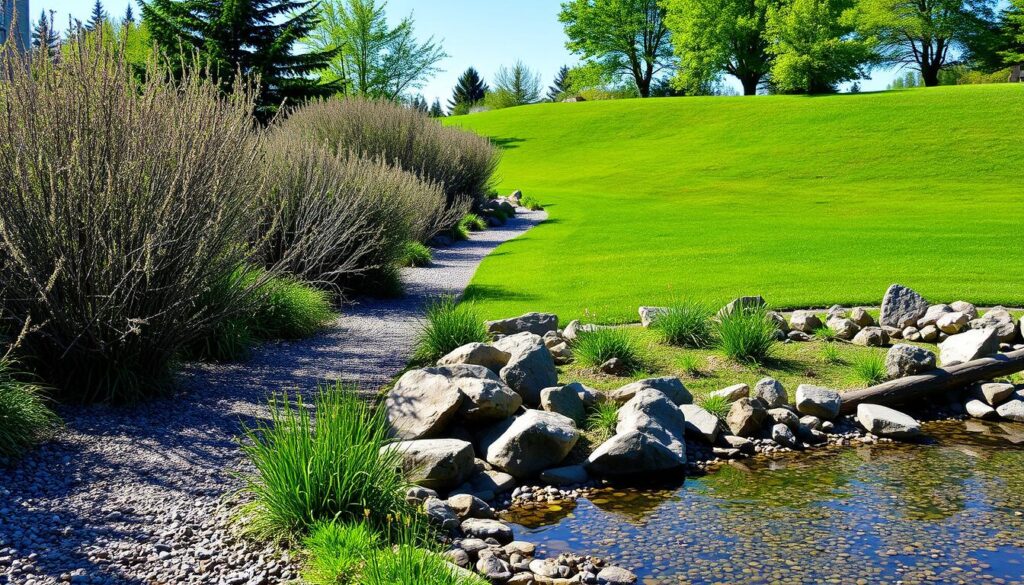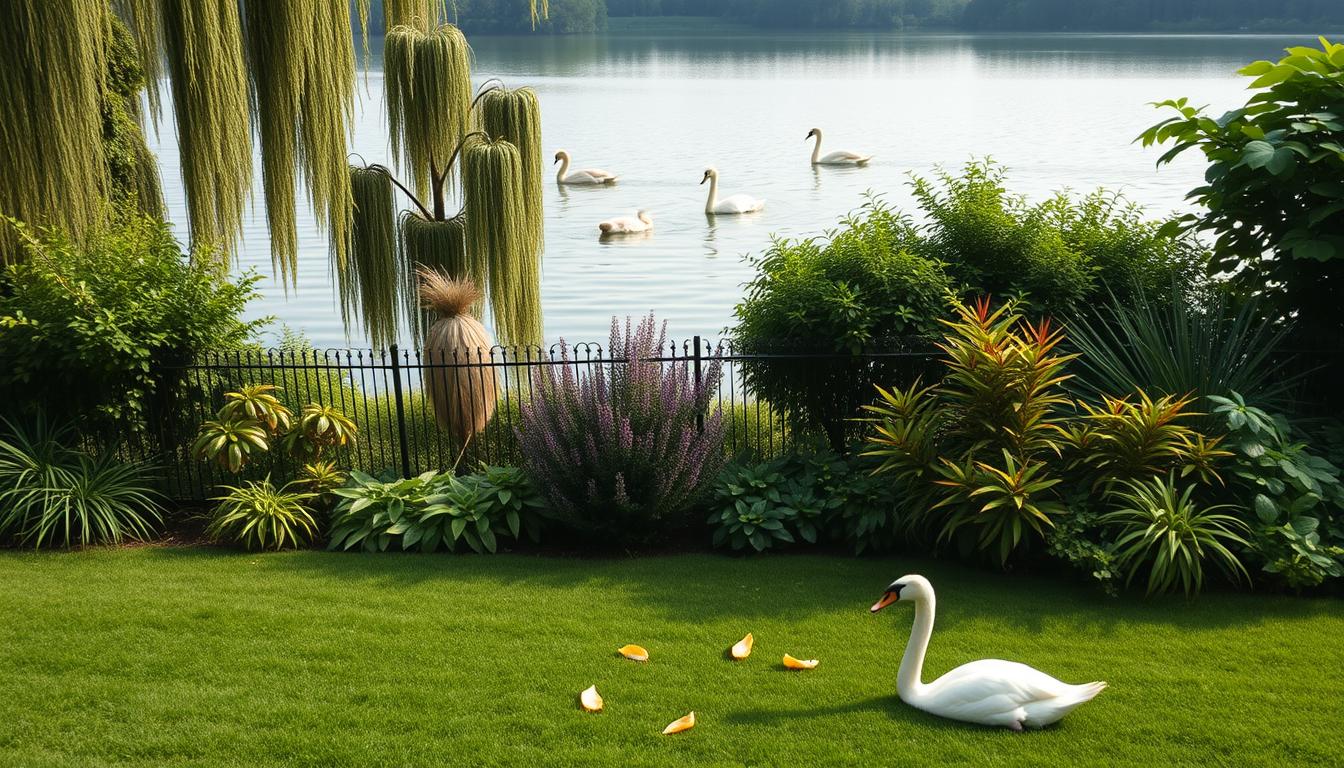Property owners often face swan invasions. Swans can make peaceful places hard to manage. They cause damage and health risks. Learning how to keep swans off your property with natural chemicals can help reduce these issues effectively.
It’s important to find ways to keep swans away naturally. This protects your place and the wildlife. Natural chemical solutions are a good choice.
Using humane methods to control swans is key. Natural chemicals help keep them away, ensuring that you can protect your property and the environment.
Key Takeaways
- Natural chemical deterrents can effectively manage swan populations
- Understanding swan behavior is crucial for successful property protection
- Eco-friendly solutions minimize environmental impact
- Consistent application of repellents increases effectiveness
- Preventative measures are more successful than reactive strategies
Understanding Swan Behavior and Property Impact
Swans are amazing birds that can affect homes a lot. Homeowners need to know how they act to keep them away. These birds are not just pretty visitors. They can cause big problems for people who live in houses.
Habitat Preferences and Feeding Patterns
Swans mostly eat plants, like 80-90% of their diet. They love places with water, like ponds or lakes. This makes homes near water sources a big draw for them. They can eat a lot of grass and plants, hurting lawns and gardens.
- Prefer open water environments
- Consume grasses, aquatic plants, and grains
- Can overgraze lawns and agricultural areas
Seasonal Behavior and Nesting Habits
Knowing how swans have babies is key to keeping them away. Mute swan parents move cygnets to water 12-36 hours after hatching. When they nest, they get very protective and can be dangerous to people.
Swans are not just beautiful – they’re complex creatures with specific behavioral patterns that can challenge property owners.
Damage and Health Risks to Property
Swans can harm health and property. Their poop can fill up ponds, making them unhealthy. They might also spread diseases like Avian Influenza, which is dangerous.
| Swan Impact | Property Risks |
|---|---|
| Lawn Destruction | Extensive Grazing Damage |
| Water Contamination | Waste Accumulation |
| Disease Transmission | Potential Health Hazards |
Understanding swan behavior helps homeowners find ways to keep them away.
How to Keep Swans Off Your Property with Chemicals Natural
To keep swans away, use natural chemicals. Homeowners can keep swans off property with chemicals. They just need to know what swans don’t like.

Natural chemicals are kind to swans. They work by messing with swans’ smell and taste. This doesn’t hurt them.
- Garlic spray: Creates an intense odor swans find repulsive
- Vinegar-based solutions: Disrupts swan feeding patterns
- Cinnamon extract: Produces an irritating sensory experience
“Nature provides the most effective solutions for wildlife management” – Wildlife Conservation Experts
Experts have found many ways to keep swans away. They use plants and their smells.
| Natural Repellent | Effectiveness | Application Method |
|---|---|---|
| Methyl Anthranilate | 85% Deterrence Rate | Spray around property perimeter |
| Capsaicin Solution | 75% Reduction | Ground and vegetation treatment |
| Essential Oil Mixtures | 60% Deterrence | Periodic landscape application |
It’s important to keep using these chemicals. Put them on again after it rains. This keeps swans away.
Physical Barriers and Landscape Modifications
To keep swans away, you need smart landscape design and barriers. Making your place less appealing and hard to get to is key.

Installing Protective Barriers
Putting up barriers is a great way to keep swans out. A fence that’s 2 to 3 feet tall works well. Choose strong materials that look good and keep swans out.
- Install fencing with small gaps
- Use mesh or wire barriers near water edges
- Ensure barriers are visually unobtrusive
Water Feature Adjustments
Changing your water features can also help. Make your place less appealing to swans. Try adding things that move in the water or making the shore uneven.
Strategic Plant Selection
Choosing the right plants is also smart. Tall grasses and thick shrubs can block swans’ view and make it hard for them to land. Plants that grow thickly can keep swans away and make your garden better.
“The key is creating an environment that feels uninviting and challenging for swans to navigate.”
Using these methods, you can keep swans away without using harmful chemicals.
Conclusion
Managing swans needs a smart and kind plan. This plan helps keep swans away from your property using natural methods. It’s important to protect both wildlife and your space.
To keep swans away, learn about their behavior. Make your area less welcoming to them. Studies show using barriers, changing habitats, and deterrents works best. It’s all about being consistent and adjusting as needed.
Experts say to find a balance between protecting wildlife and your property. It’s important to think about swans’ role in nature. Using professional wildlife management can help find solutions that work for everyone.
Managing swans well takes time, creativity, and knowing about local wildlife. With the right, kind strategies, you can keep swans out. This way, you also respect nature and keep things peaceful.

